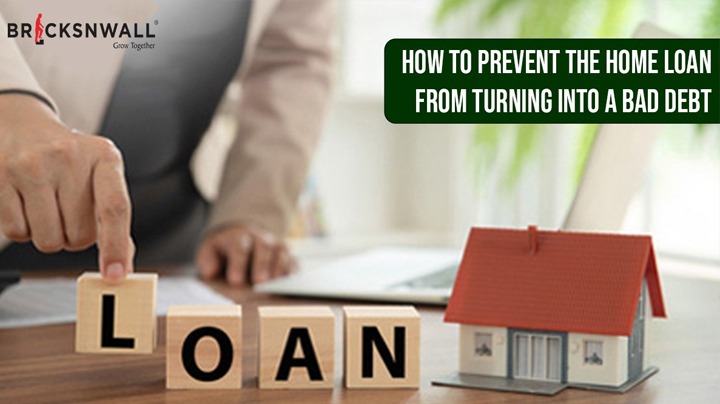How To Prevent The Home Loan From Turning Into A Bad Debt
Bricksnwall Trusted Experts

A home is
one of the most important purchases you will ever make. Most people must obtain
a home loan to fund the purchase of a property. But if you are careless, a home
loan could easily become a bad debt affecting your financial credit score and
stability. In this article, we'll review some advice for avoiding bad debt
with a home loan.
Pick
the appropriate loan.
Selecting
the right loan is the first step in keeping your house loan from becoming a bad
debt. Loans come in various forms, including interest-only, fixed-rate, and
variable-rate loans. Learning about the many loan types, comprehending them,
and selecting the one best for your financial condition is crucial. To choose
the loan that most closely matches your needs and financial situation, seek
professional advice.
Create
a sensible budget.
Because they
don't create a realistic budget before applying for a loan, borrowers are one
of the main causes of home loans turning into bad
debts. Make a budget considering your monthly income, spending, and long-term
objectives before applying for a mortgage. Make sure the monthly payments
don't interfere with your ability to pay other bills and expenses and that
they don't exceed your budget.
Save
funds for a down payment.
A sizeable
down payment can dramatically lower the amount you must borrow, preventing your
house loan from becoming a bad debt. Try to set aside at least 20% of the
property's buying price as a down payment. It will not only assist you in
lowering your monthly payments but also improve your chances of accepting the
loan.
Don't
make the loan duration longer.
Although
extending the loan term may seem like a good way to reduce monthly payments,
doing so may cause you to pay more interest over time; a loan with a longer
duration may also be more challenging to repay, resulting in late payments and,
ultimately, bad debt. It is best to select a loan term that fits within your means
and work towards paying off the debt as quickly as possible.
Pay
more than the required minimum.
Paying more
than the required minimum can speed up loan repayment and reduce interest
costs. Even if you can only pay a small amount more each month, it will add up
over time and have a substantial impact. To ensure you never miss a payment and
pay off the loan on time, consider setting up automated installments.
Refinance
if required.
Consider
refinancing your mortgage if you have trouble making payments or paying a
high-interest rate. Your monthly payments, interest rate, and loan length can
all be reduced with refinancing. To ensure that refinancing is the best option,
it is crucial to consider the costs and benefits.
Monitor
your credit rating.
Your ability
to get a house loan and the interest rate you'll be offered both heavily
depend on your credit score. It is essential to monitor your credit score and,
if required, take action to raise it. Pay your bills on time, maintain a low
credit card balance, and refrain from applying for too many loans or credit
cards simultaneously.
Conclusion
To sum up, a home loan is a big financial commitment that needs careful thought and planning. You may stop your house loan from becoming a bad debt by picking the right loan, creating a reasonable budget, saving for a down payment, avoiding extending the loan term, paying more than the minimum amount, refinancing if required, and monitoring your credit score. Never forget to get professional advice and conduct an in-depth study before deciding on your home loan.




